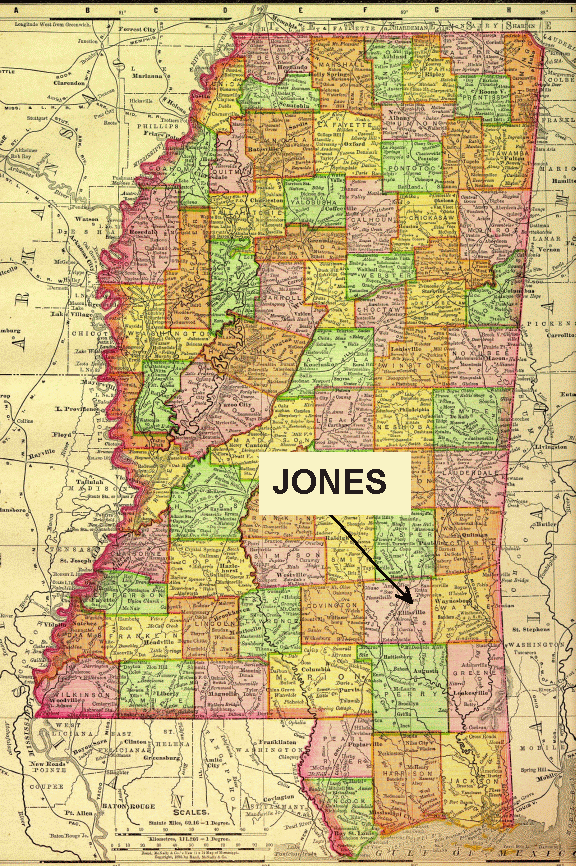Introduction to Jones County's Civil War Saga
Jones County, located in the heart of Mississippi, is a place steeped in rich history and intriguing tales from the past. The Civil War era, in particular, marks a significant chapter in the county's history. The story of Jones County during the Civil War is not just about battles and strategies; it's a fascinating narrative of resistance, survival, and the quest for autonomy. Known for its unique stance during the Civil War, Jones County offers a compelling glimpse into the lives of those who dared to challenge the status quo. As we delve into the history of Jones County, we uncover a story that defies conventional narratives and presents a different perspective on the Civil War experience in the American South.
The Historical Context of Jones County
To fully appreciate the significance of Jones County during the Civil War, it's essential to understand the broader historical context. The county, predominantly rural and composed of small farms, had a population that was less reliant on slavery compared to other Southern regions. This demographic difference played a crucial role in shaping the county's unique response to the Civil War. Many residents of Jones County were yeoman farmers who felt little allegiance to the Confederate cause, which they believed served the interests of wealthy plantation owners rather than their own. This sentiment laid the groundwork for the county's eventual resistance against Confederate authority, a movement that would become a defining feature of its Civil War history.
The Infamous Free State of Jones
The most famous episode in Jones County's Civil War history is the establishment of the Free State of Jones. Led by Newton Knight, a disillusioned Confederate soldier, a group of local residents declared their independence from the Confederacy in 1864. This bold declaration was not just an act of rebellion but a reflection of the deep-seated discontent among the county's populace. The Free State of Jones was a haven for deserters, escaped slaves, and those who opposed the Confederate government. It was a place where the ideals of freedom and self-determination took precedence over allegiance to a Confederate cause that many in the county found unjust. The legacy of the Free State of Jones continues to captivate historians and enthusiasts alike, symbolizing a unique stand against Confederate authority during the Civil War.
Newton Knight: The Man Behind the Legend
At the heart of Jones County's Civil War story is Newton Knight, a complex and enigmatic figure whose actions have made him both a hero and a controversial character in American history. Knight's leadership in the establishment of the Free State of Jones has been the subject of numerous books, films, and scholarly debates. A former Confederate soldier, Knight became disillusioned with the war and its impact on his community. His decision to lead a rebellion against the Confederacy was driven by a desire to protect his fellow citizens and uphold the principles of equality and justice. Knight's life and legacy offer a fascinating lens through which to examine the moral and ethical dilemmas faced by individuals during the Civil War, as well as the broader social dynamics of the time.
The Role of Women in Jones County During the Civil War
While much of the focus on Jones County during the Civil War centers on the actions of men like Newton Knight, the contributions of women were equally significant. Women in Jones County played crucial roles in supporting the resistance movement and maintaining the community's resilience in the face of adversity. From providing food and shelter to those who sought refuge in the Free State of Jones to participating in espionage activities, women were instrumental in the county's defiance of Confederate authority. Their stories, often overshadowed by those of their male counterparts, highlight the vital role that women played in shaping the course of history during the Civil War. Understanding the experiences and sacrifices of these women is essential to gaining a complete picture of Jones County's Civil War legacy.
Reconstruction and Its Impact on Jones County
The end of the Civil War marked the beginning of a new chapter for Jones County, as the challenges of Reconstruction posed significant obstacles for its residents. The transition from a wartime economy to a peacetime society was fraught with difficulties, as the county struggled to rebuild its infrastructure and economy. The legacy of the Free State of Jones continued to influence the county's social and political landscape, as former Confederates and Unionists sought to coexist in a post-war environment. The Reconstruction era in Jones County was characterized by a complex interplay of reconciliation and tension, as the community navigated the challenges of reunification and the pursuit of a more equitable society.
The Legacy of Jones County's Civil War Experience
The story of Jones County during the Civil War is not just a historical footnote; it is a testament to the enduring spirit of resistance and the quest for justice. The county's unique stance during the war has left a lasting legacy that continues to resonate in contemporary discussions about the Civil War and its impact on American society. The Free State of Jones, in particular, serves as a powerful symbol of the struggle for autonomy and equality in the face of overwhelming odds. As we reflect on the history of Jones County, we are reminded of the importance of understanding diverse perspectives and the complexities of history, as well as the enduring relevance of the principles that guided its residents during the Civil War.
Visiting Jones County: A Journey Through History
For those interested in exploring the rich history of Jones County and its Civil War experience, a visit to the county offers a unique opportunity to step back in time. The area is home to several historical sites and landmarks that provide insight into the county's past, including the Knight Homestead and the Jones County Courthouse. Visitors can immerse themselves in the stories of those who lived through the tumultuous years of the Civil War and gain a deeper understanding of the county's unique place in American history. Whether you're a history enthusiast, a Civil War buff, or simply curious about this fascinating chapter in our nation's past, Jones County offers a captivating journey through time.
Preserving the History of Jones County for Future Generations
As we look to the future, the importance of preserving the history of Jones County and its Civil War experience cannot be overstated. Efforts to document and share the stories of the county's residents during this pivotal time are crucial to ensuring that future generations have access to a comprehensive understanding of our nation's history. Local historians, educators, and community organizations play a vital role in this endeavor, working to collect and preserve artifacts, oral histories, and archival materials related to Jones County's Civil War legacy. By supporting these efforts, we can ensure that the rich history of Jones County continues to inspire and educate for years to come.
Conclusion: Reflecting on Jones County's Civil War Legacy
The story of Jones County during the Civil War is a remarkable tale of resistance, resilience, and the quest for justice. It challenges conventional narratives and offers a unique perspective on the complexities of the Civil War experience in the American South. As we reflect on the legacy of Jones County, we are reminded of the enduring power of history to inform and inspire. By exploring the past, we gain valuable insights into the present and future, as well as the principles that continue to shape our society. The history of Jones County is not just a story of the past; it is a testament to the enduring spirit of those who dared to stand up for what they believed was right, and a reminder of the importance of preserving our shared heritage for future generations.


